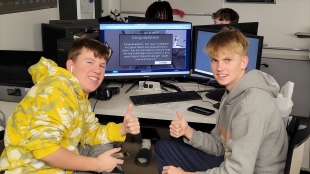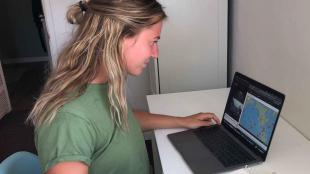Cal Poly Team Hopes to Shape California’s Cybersecurity Policy with $150,000 Hewlett Grant
A $150,000 grant from the William and Flora Hewlett Foundation will allow a Cal Poly team to work with public and private entities to research and suggest policy options on cybersecurity while providing technical assistance to address a major cyberthreat.
California, which has the world’s fifth largest economy, is especially vulnerable to cyberattacks that threaten economic security, public health and safety, said Martin Minnich, program manager at the California Cybersecurity Institute (CCI).
“California is the No. 1 target for cybercrime in the U.S.,” Minnich said, citing recent FBI statistics. “The California Office of Emergency Services, California Department of Technology, California Highway Patrol, and California Army National Guard are protecting the state from cybersecurity threats. Cal Poly can be at the forefront of innovating new solutions by leveraging the deep subject matter expertise from the public sector and the technical expertise of our private partnerships to protect the state today and in the future.”
The gift was awarded based on a proposal that called for an interdisciplinary team that includes the CCI, the Cal Poly Digital Transformation Hub Powered by AWS (DxHub), the College of Engineering, and the Political Science Department.
“From an educational perspective, this project provides opportunities for students to work on an applied problem with decisionmakers who are working through a complex, interdependent and technical problem with huge, real-world implications,” said Elizabeth Lowham, chair of the Political Science Department. “It is, by definition, Learn by Doing. This level of collaboration and partnership with stakeholders is unmatched.”
The CCI is a College of Engineering institute through which public agencies, private entities and higher education can conduct applied research, develop training curricula and respond to the immediate crises of cybersecurity. The DxHub connects students with public sector organizations to address a variety of challenges that include electronic tracking of cattle, digital forensics in the cloud, data-driven deployment of law enforcement resources, and more.
Established in 1966 by William R. Hewlett, his wife, Flora Lamson Hewlett, and their oldest son, Walter, the William and Flora Hewlett Foundation is a nonpartisan, private charitable foundation that advances ideas and supports institutions to promote a better world. The organization’s Cyber Initiative is one of nine main categories it hopes to advance.
In this case, CCI and its partners will use the grant to identify possible guidelines and procedures for Cyber Protection Teams and conduct critical infrastructure research.
“This diverse team of public, private and academia will help fuel innovation,” Minnich said.
From the policy side, Lowham hopes to have a class dedicated to the project, developing guidelines and procedures for the state’s Cyber Protection Teams. She and fellow faculty members Anika Leithner (political science) and Bruce DeBruhl (computer science and software engineering) will work with a team of students on collecting background information and participating on the project with stakeholders.
“It’s kind of amazing – the access that this opportunity provides to students to interact with, learn from and with, and work on a live policy problem,” Lowham said. “The processes and outcomes of the project can be modeled and adapted for other, similarly situated organizations and states.”
Meanwhile, the students from CCI and the DxHub will frame a specific problem and find potential solutions.
“An important component in having students involved in challenges is to leverage their new perspectives on solutions,” said Paul Jurasin, program manager of the DxHub.
“Students can add to this project in various ways, from providing policy analysis and data analysis to developing prototypes of solutions if that is required,” Jurasin said. “The DxHub works to include students in all components of the innovation challenge process.”
Once a specific problem is identified and solutions are offered, the team will conduct a cybersecurity exercise in November via a full-scale live immersive environment.
For students, the project represents an excellent example of Learn by Doing: Students working on policy get to work with key stakeholders on a complex, current issue, and technical students will get hands-on experience in the field of cybersecurity – an emerging field with plenty of openings.
“We have close to 37,000 jobs to help fill,” Minnich said.


